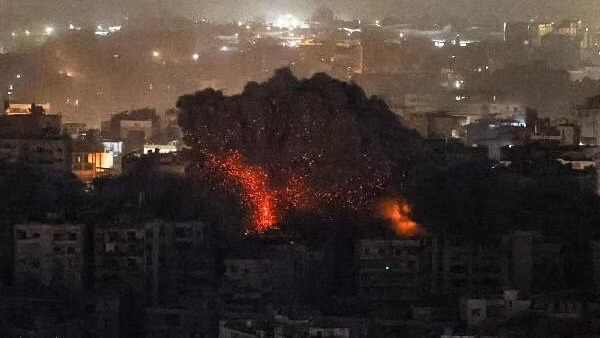———– Iran warns will defend itself after Israeli strikes
WASHINGTON: The US positioned a fleet of fighter jets on standby to rescue Israeli pilots if Tel Aviv’s Saturday attack on Iran had gone badly, Israeli media reported.
“Israel and the US coordinated a plan to ensure the safe extraction of pilots should the operation have not succeeded,” said Israeli Army Radio on Sunday.
The report stressed that while the US did not take part in the attack itself, a fleet from US Central Command (AFCENT) was prepared to intervene if necessary.
“The Americans’ advanced capabilities in the region would allow them to carry out a rescue operation,” the report stated.
Despite this readiness for potential US intervention, the Israeli Air Force had already devised an “inde-pendent plan for pilot rescue without relying on American support,” it added.
Israeli on Saturday said it had carried out a four-hour assault on Iran, with Tehran stating that it had successfully repelled “attempts by the Zionist entity to attack some points in Tehran and across the country.”
According to the Iranian military, the Israeli strikes killed four soldiers.
This attack followed Iran’s launch of over 180 missiles at Israel on Oct. 1, which Tehran described as “retaliation” for the assassinations of top leaders of Palestinian group Hamas and Lebanese Hezbollah.
Iran had previously warned that any Israeli attack would be met with a “harsher response.”
Earlier, Iran warned on Saturday it would defend itself after Israeli air strikes killed at least two soldiers and further stoked fears of a full-scale regional war in the Middle East.
Israel warned Iran would “pay a heavy price” if it responded to the strikes, and the United States, Germany and Britain demanded Tehran not escalate the conflict further.
US President Joe Biden said he hoped “this is the end” after the pre-dawn Israeli strikes, noting that “it looks like they didn’t hit anything other than military targets”.
The European Union called for all parties to exercise utmost restraint to avoid an “uncontrollable esca-lation”.
Other countries, including many of Iran’s neighbours, condemned Israel’s strikes and some, such as Russia, urged both sides to show restraint and avoid what Moscow dubbed a “catastrophic scenario”.
Iran insisted it had the “right and the duty” to defend itself, while its Lebanese ally Hezbollah said it had already launched rocket salvos targeting five residential areas in northern Israel.
The Israeli army said 80 projectiles were fired across the border on Saturday.
Hezbollah later issued evacuation warnings for more than a dozen named locations in Israel, in a new move mirroring the warnings long put out by the Israeli military for areas of Gaza and Lebanon where it intends to operate.
Confirming its own strikes after explosions and anti-aircraft fire echoed around Tehran, the Israeli mili-tary said it had hit Iranian missile factories and military facilities in several regions.
The “retaliatory strike has been completed and the mission was fulfilled”, and Israeli aircraft “returned safely”, a military spokesman said.
Iran confirmed Israel had targeted military sites around the capital and in other parts of the country, saying the raids caused “limited damage” but killed four soldiers.
Iran’s armed forces general staff said only radar systems were damaged in the strikes and held back from any threat of immediate retaliation.
“While reserving its legal and legitimate right to respond at the appropriate moment, Iran is prioritising the establishment of a lasting ceasefire in Gaza and Lebanon,” it said.
Foreign Minister Abbas Araghchi said there were “no limits” to Iran’s determination to defend itself.
The United Nations atomic energy watchdog on Saturday said that Iran’s nuclear programme — a source of international controversy — was not affected by Israel’s deadly air strike on its arch-rival’s military facilities.
“Iran’s nuclear facilities have not been impacted,” IAEA director general Rafael Grossi wrote on X, urg-ing “prudence and restraint from actions that could jeopardize the safety and security of nuclear and other radioactive materials.” –Agencies




